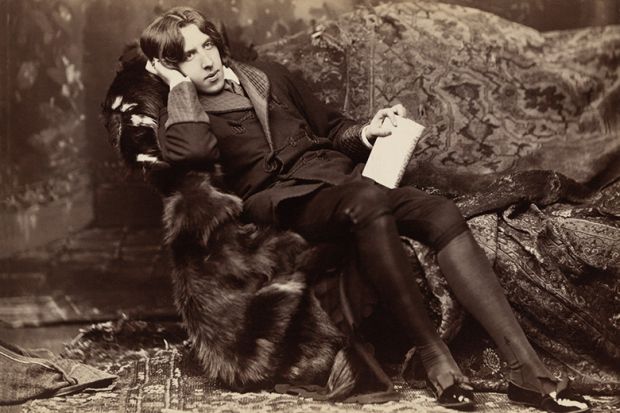Oscar Wilde wrote comedies and lived tragedies. A genius set upon by devils, he feared impending catastrophe both before and after prison. Pitiful rather than stoical – he compared himself to the mythical flayed Marsyas – always confused and contradictory, he propelled himself into a series of self-inflicted disasters. The embodiment of a Nietzschean eternal recurrence and Freudian repetition-compulsion, he could not help reproducing the fatal pattern of his former life.
Nicholas Frankel’s readable, but mainly familiar, account of Wilde’s last three post-prison years (1897-1900) closely follows – often using the same quotes – Richard Ellmann’s more stylish and incisive biography of 1988. But it is difficult to surpass his brilliant predecessor. Frankel lapses into lazy clichés and is tediously repetitive, even in the same paragraph. He claims that the French production of Salomé led to Wilde’s more humane treatment in prison, but since the play was banned in England it would not have enhanced his reputation. Opposing the sound judgement of W. B. Yeats and Seamus Heaney, Frankel defends a particularly awful stanza in The Ballad of Reading Gaol. He devotes 30 pages to this poem, but fails to see the fatal flaw in Wilde’s argument. Although his crime and punishment were quite different, Wilde emphasised his own martyrdom by equating himself with the guilty and executed wife‑killer.
Wilde’s infatuation with Lord Alfred Douglas had led to his conviction for “gross indecency” and to two years of strictly enforced hard labour, cruelly combined with solitary confinement, disgusting food and persistent sickness. One cannot blame the old satyr for wanting to have a good time with food, drink and sex after his extremely harsh punishment, but it is impossible to admire – as Frankel does – his self-immolating hedonism and irrational return to the man he had once wanted to kill for ruining his life.
Douglas – his corrupt copain, gilded pillar of infamy and devil in his flesh – was beautiful but superficial, selfish and treacherous. He leeched off Wilde, competed with him for boys, rejected him when he was weakened by illness and incited Wilde to destroy himself to prove his loyalty and love. Ellmann condemned Douglas’ “greed, rage and cruelty”. Frankel’s attempt to rehabilitate the loathsome Douglas and make him more sympathetic is not at all convincing.
Wilde’s last years included humiliating poverty, begging for money and living in miserable hotel rooms. As George Orwell wrote of the decadent artists in Cyril Connolly’s The Rock Pool, he spent on sodomy what he gained by sponging. But Wilde was still capable of witty remarks. He said that his youthful “guide” in Rome knew nothing about the city and had other more pressing responsibilities. In Genoa, he lived on 10 francs a day, “boy compris”. He claimed at the end to be “dying above his means”.
Wilde’s famous declaration that his pursuit of male prostitutes “was like feasting with panthers, the danger was half the excitement” must be taken literally. He was sexually aroused by risks and danger, by exposure and disaster. Unreformed by prison, he remained unrepentant and fascinated by destruction. Driven by guilt about his homosexuality and the damage that he had inflicted on his long-suffering wife and young sons, he felt the need to punish himself. In this tragic scenario, Douglas was the secret sharer of his doom.
Jeffrey Meyers has recently published Robert Lowell in Love and The Mystery of the Real: Conversations with Alex Colville (both 2016).
Oscar Wilde: The Unrepentant Years
By Nicholas Frankel
Harvard University Press, 384pp, £23.95
ISBN 9780674737945
Published 27 October 2017
Register to continue
Why register?
- Registration is free and only takes a moment
- Once registered, you can read 3 articles a month
- Sign up for our newsletter
Subscribe
Or subscribe for unlimited access to:
- Unlimited access to news, views, insights & reviews
- Digital editions
- Digital access to THE’s university and college rankings analysis
Already registered or a current subscriber? Login




